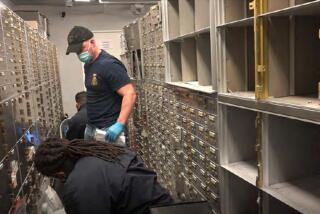Judge Rules Against Program Allowing Copying of DVDs
- Share via
NEW YORK — In a big win for the entertainment industry, a federal judge ruled Thursday that it was illegal for a Web site publisher to either post, or link to, the software code that breaks the electronic locks on DVDs.
U.S. District Judge Lewis Kaplan said this closely watched test case about copyright law and digital media should send a message that using the Internet to copy music and films is “stealing.”
In a broad and sweeping 89-page opinion that adopted the burglary rhetoric of the film industry, Kaplan upheld the constitutionality of the Digital Millennium Copyright Act. He also ordered defendant Eric Corley of Setauket, N.Y., operator of 2600.com, a hacker Web site, to remove all his links to hundreds of other sites around the world which also post the DVD (digital videodisc) decryption code known as DeCSS.
“Today’s landmark decision nailed down an indispensable constitutional and congressional truth: It’s wrong to help others steal creative works. The court’s ruling is a victory for consumers and for legitimate technology,” said Jack Valenti, chairman of the Motion Picture Assn. of America.
Corley said Kaplan’s ruling was based on “misperceptions” and that “he didn’t understand the legitimate use of DeCSS, namely to allow consumers to play their own DVDs on their own computers.”
He also disputed Kaplan’s contention that Corley advocated illegal use of copyright material.
“We’ve never said anything of the sort, and we’ve consistently condemned piracy,” Corley wrote in an e-mail.
Lawyers for Corley on Thursday repeated their prediction that this case would be won on appeal.
“The judge is really wrong,” said Ed Hernstadt, a defense attorney. “We are confident that we will be more successful in the appellate courts that are more protective of the rights of the public and rights under the 1st Amendment.”
While not totally surprised about Kaplan’s ruling, the defense team did not expect him to also ban 2600.com from linking to other sites with DeCSS. “He is carving out a new exception for software under the 1st Amendment,” said Robin Gross of the Electronic Frontier Foundation, the San Francisco-based cyber-liberties organization that funded Corley’s defense.
Corley, who uses the pen name Emmanuel Goldstein on the Net, said he had already taken down the links. “However, we are LISTING other sites that have the DeCSS code. If the MPAA actually succeeds in making it illegal to have such a list, I pray for the future of this country,” Corley wrote.
Leon Gold, the lead lawyer for eight Hollywood film studios that had sued to force 2600.com’s owner to remove the program from the Web site, said the ruling will have a “powerful effect” on other big copyright cases that are pending, such as the recording industry’s lawsuit against Napster Inc. in San Francisco and the Manhattan case which the record and movie industries brought against the Web site Scour, another search engine that allows users to find and download films and music.
“This is a resounding affirmation that the Internet is not an excuse to steal intellectual property that is copyrighted,” Gold said.
However, reflecting a growing sentiment in the entertainment industry that aggressive litigation was sending a negative message to their customers, Gold said he hoped most people will start to comply with the law, noting, “At the end of the day we must do what we must do, but we hope more suits are not necessary.”
Kaplan refused to make Corley liable for the hundreds of thousands of dollars in attorney fees involved in the case but did say that he would have to pay thousands of dollars in costs.






